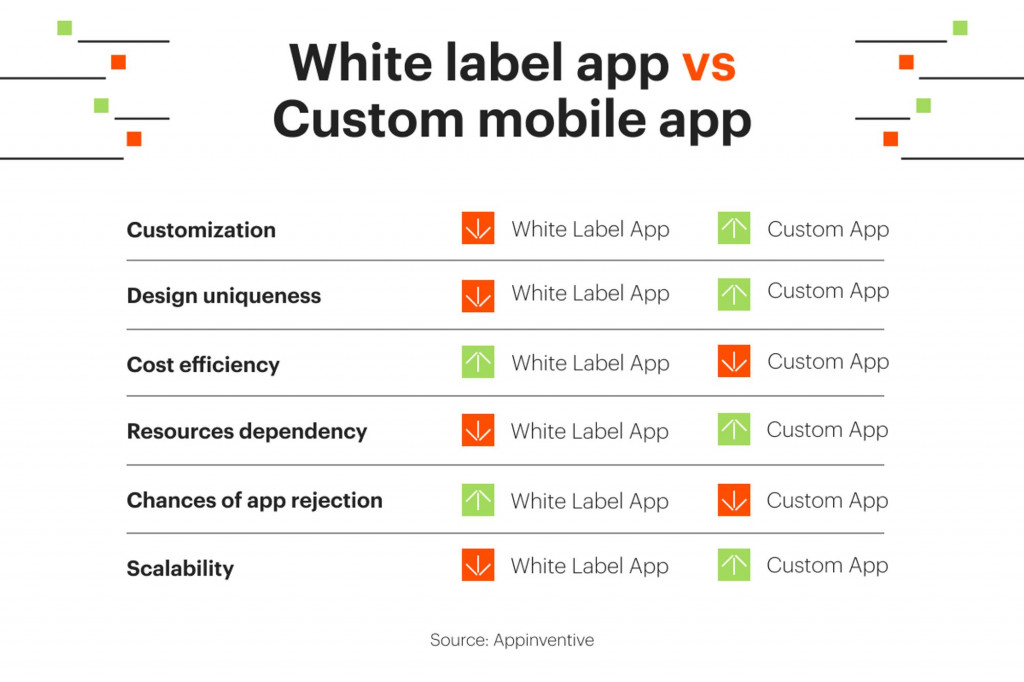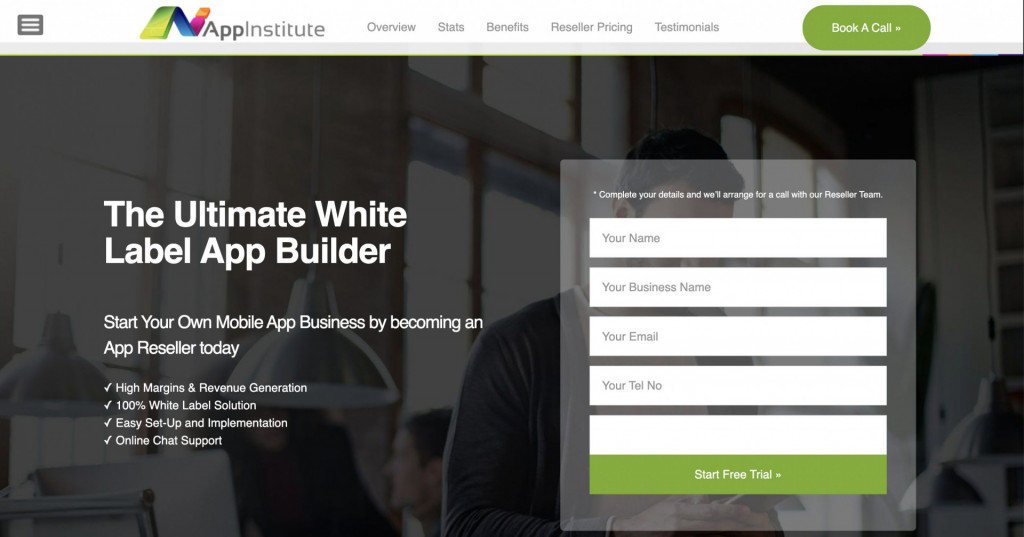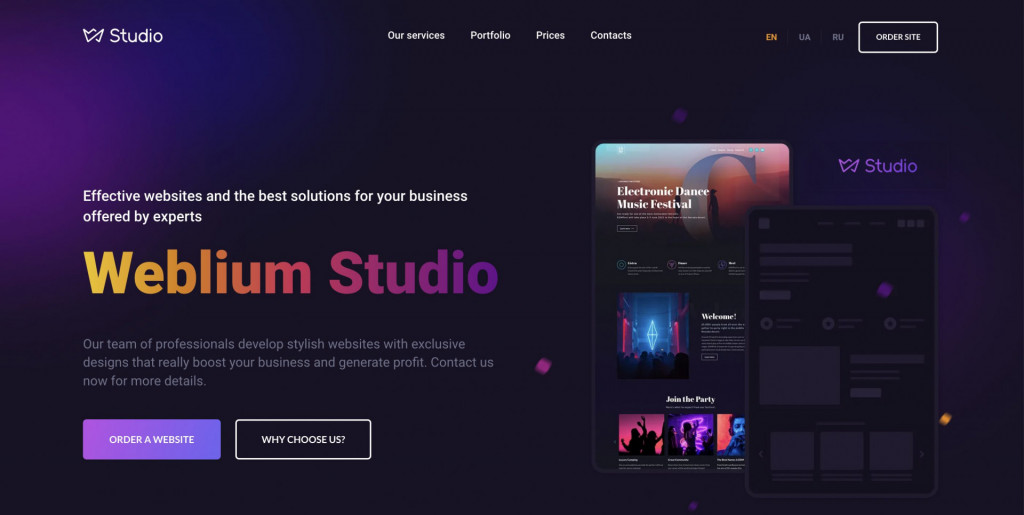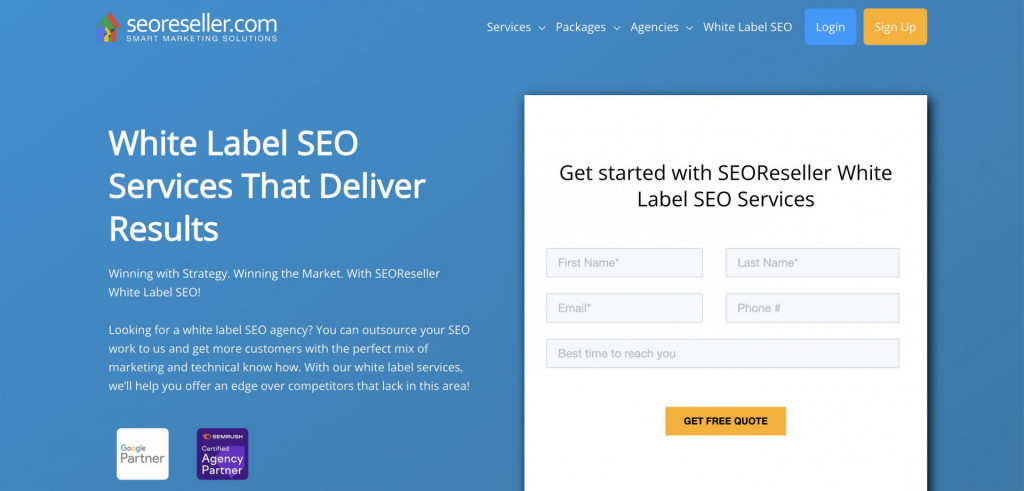What’s White-Label Apps? Is Building a White Label App a Good Idea?
How can you save time and money on product development? What will help satisfy your customers and popularize the brand? The partner business model known as the white-label apps development answers these entrepreneurs’ requests. White-label apps are also a legal protocol allowing you to resell and rebrand the product service under another company’s brand.
In our article, learn everything you need to know about white-label app development.

What are white label mobile apps?
White label refers to a product or service created by one company but sold by another under their brand. This allows businesses to offer more products without having to create them themselves.
White label app and website development is like ghostwriting. A company designs a website or app for another company to purchase and further resell. The developer cannot associate its brand with the created website or software. Yet, the purchasing company has the total freedom to use its brand, logo, and identity.
This concept applies to other web design services, including SEO, content creation, website design, and content management systems. White label web design services facilitate the mutual growth of digital agencies’ profit and clients’ success.
You may have plenty of unique ideas for product designs but lack the necessary expertise and resources to bring them to life. At other times, managing web development processes while keeping up with your core business operations may be difficult. In such cases, white label and startup app development can be excellent options to enhance your growth.
Which industries use white-label apps?
White-label solutions have become popular with businesses seeking a mobile app with standard features. This model has now expanded to various business sectors, both online and offline, making it a go-to option for many industries.
Here are some of the most popular areas using a white label technology:
- Fintech. White label apps can transform fintech for financial institutions. Features like multi-user collaboration, biometric authentication, chatbots, cross-platform integrations, analytics, and data visualization provide users with a seamless experience when it comes to banking, lending, and everything in between.
- Taxi and ridesharing. These apps require both passenger and driver features, including a user-friendly signup process, real-time tracking, ride request acceptance/rejection, an electronic payment gateway, and built-in navigation.
- Traveling and tourism. Mobile apps can improve the travel and hospitality industry by offering customers a convenient and personalized experience. They provide features such as booking travel, managing reservations, and real-time flight updates, which can help businesses stand out from competitors.
- Public catering. White label app solution allows catering businesses to improve their customers’ experiences. These applications may offer online ordering, phone-to-table, procurement, and payment features.
- Retail and e-commerce. Retail and e-commerce are among the most significant users of mobile applications. Customers benefit from features such as wishlists, one-click checkout, secure payment, shipping options, and order tracking.
- Banking. Banks can offer mobile apps for easy account management, transfers, and financial services. Additional features like budget tracking and loan applications can help them differentiate from competitors.
Since you cannot influence the quality of a ready-made solution bought from a dedicated iOS/Android app developer, choosing a reliable partner with a good reputation in the market is essential. This ensures you get a custom white label app that meets your business needs.
White label mobile apps vs custom mobile apps: what’s the difference?
White-label apps work well for simple business processes, but their usefulness might be limited for more complex products. To fit your specific business’s requirements, you need to either tailor white-label apps’ functionality or develop a custom mobile app.
Let’s examine the main differences between white-label and custom mobile apps.
Personalization and control
The main difference between white-label and custom mobile apps is the customization and control businesses have over the app. White-label apps are pre-built solutions that offer limited customization options. They are designed to be quickly deployed and require minimal development effort.
Conversely, custom mobile apps allow complete control over the app’s design, functionality, and features. They are built to meet a business’s unique demands and can be tailored to specific user requirements. While white-label apps are easy to deploy, custom mobile apps offer greater flexibility, scalability, and personalization.
Cost-effectiveness
Regarding mobile applications, white label apps are more cost-effective than custom apps. The cost of a mobile app development depends on various factors, such as your budget, the application features, and the development team you choose to work with.
A complex white label app setup may cost more than a mobile app solution with standard features. Customization is another factor that may make white label app development services appear costly, as some developers may charge additional fees for customizing and maintaining the application.
Here is a chart comparing the benefits and drawbacks of white label and custom app development:
Benefits of white-label apps
Cresconnect advises adding rebrandable and resalable digital marketing services and products to the primary company strategy because it has many advantages. Here are some of them:
Scalability
Scalability has always been one of the most beneficial advantages. The white label solutions allow you to grow your organization quickly and safely in various ways.
Resource-saving
You may lower your overhead and resource costs and increase revenue potential. White-label solutions reduce expenses in many ways because they are ultimately cost-effective.
Growth
White label mobile apps may help you increase the size of your product offering. Also, it can enable you to transition from being an entrepreneur to running an agency. With white and private label solutions, you can quickly incorporate new products or services into your core offerings.
Competitive edge
Remember that your application makes you stand out from the crowd because the number of ways you can customize it is enormous. White-label options are fantastic ways to expand your brand, build a solid reputation, and grow revenue.
Disadvantages of white-label apps
White label apps are great tools, but you have to keep in mind some of their drawbacks.
Limited control
When using a white-label app, you outsource your app development to a third-party vendor. This means you have limited control over the app’s development process, features, and underlying architecture. Additionally, you may depend on the vendor to update and maintain the app, which can be time-consuming.
Limited support
White-label apps are typically designed to be easy to use and maintain. However, the vendor may not provide the technical support you require since the app is not built specifically for your business.
Limited brand uniqueness
While white-label apps can be a cost-effective solution for businesses, they can also cause branding issues. Since these apps are designed to work for multiple businesses, they may not align with your brand image and values, which can lead to confusion among your customers.
The types of white-label solutions [with examples]
We have compiled a list of the top three white-label services and solutions, along with examples of how they can enhance your business offerings.
App Building
White-label software enables businesses to create customized apps without extensive coding or development work. This can help companies save time and money by providing pre-built templates and features that can be easily customized for their needs. Additionally, it helps businesses maintain their brand identity while offering cutting-edge digital solutions to their customers.
AppInstitute is an example of white-label software for creating customized apps. It allows small business owners to create apps using a simple drag-and-drop interface. You can create a beautiful app with intuitive modules and customizable features in just a few hours. Choose an app template based on your business type and purpose, and enter your website name to find the perfect color scheme. All apps come with built-in analytics, push notifications, and multi-language support. This software enhances customer management and helps you achieve your business goals.
Source: https://appinstitute.com/resellers/
Website creating
A white label website builder platform allows businesses to design and sell websites under their own brand without the need for technical skills. It offers customizable templates, drag-and-drop editors, and other features to quickly and easily create professional-looking websites. About 51% of small companies utilize white-labeled websites.
Shopify is the most well-known white label website builder. Weblium Agency is another excellent example. It provides access to tools that simplify your work, including
- over 150 pre-designed templates for different niches,
- a branded website builder with a personal domain name and logo,
- a responsive design for each template,
- an AI design supervisor to optimize fonts and styles.
Source: https://studio.weblium.com/
Digital Marketing
Two-thirds of small-medium businesses use digital marketing white-label platforms for their business needs. Providers like SEO Reseller offer a complete kit of SEO tools for digital marketing agencies, SEO companies, and consultancies. The platform includes a team of highly trained experts, a scalable methodology, and valuable tools:
- a real-time dashboard for complete visibility of campaign performance,
- website audits for ranking opportunities and keyword recommendations,
- content creation and comprehensive keyword research,
- organic lead acquisition, and
- lead tracking directly on a dashboard.
Source: https://www.seoreseller.com/white-label-seo
2 options for white label app development
White label apps can be developed in 2 ways:
- Working with a third-party provider who creates primary and general app features compatible with most mobile devices,
- Using no-code or low-code development platforms to build your own app.
The latter option allows the creation of highly scalable and complex applications without coding knowledge or assistance from white label app developers.
No-code and low-code platforms for white label app development are suitable for everyone. They are easy to use and offer quick and effective solutions for your development pain points.
However, if you do not want to spend time and take risks developing it yourself, you can go for the former option.
White-label apps development process with a development company
Building a white label mobile app with a developer company includes the following steps:
Step #1. Consultation
Creating a white label mobile app that meets your business needs starts with an initial consultation with your dedicated team. During this phase, you will collaborate with the team to visualize the end product of your mobile application. The team will create a profile of your mobile application’s target audience and discuss the best features of your application with you.
This step also involves learning about the best practices for building mobile applications. In general, it will help you decide whether a white label application is the right solution for your business.
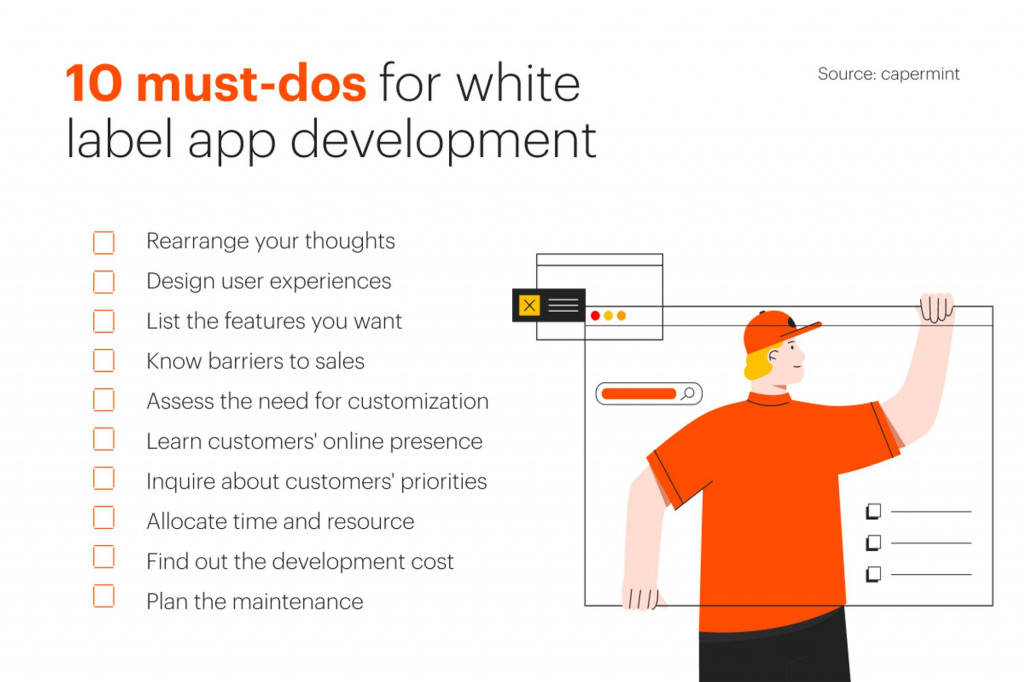
Step #2. Development and customization
Professionals customize the white label mobile app during the app development process to meet your business needs. They will also optimize the app’s features to make it more effective for users.
Should you require a custom graphic design for your app, some companies will meet your needs and provide some flexibility in design colors or app layout.
This customization will include rebranding your mobile app to reflect your company’s image. The developers pay great attention to detail to ensure everything in the mobile app matches your company’s aesthetic. They ensure personalized details such as your company logo, fonts, graphics, colors, and other app design elements. This will create a unique brand experience for the app’s end-users and make your brand more recognizable.
Step #3. Launch
Your mobile app gets fully customized before being tested and launched. After the launch, the app is placed in the App Store and Play Market. Now, users can download, utilize, and provide feedback on this new addition to your business.
Step #4. Promotion
Your business may encourage and incentivize users to download the mobile app through marketing and promotional activities. The application development team will provide ongoing support during and beyond the launch phase. This will ensure your company gets the most out of its newly developed app.
How to choose a white-label app development company
When it comes to developing competitive applications, the choice of developer company is crucial to success:
- Consider your business’s goals and needs and prepare to communicate them to potential development teams.
- Assess the company’s experience and knowledge in the IT industry and how well they know the current app development trends.
- Decide on the tasks you will delegate to the company and the ones you will perform yourself.
When making the final decision, you should consider the company’s experience and expertise, communication effectiveness, and development costs.
Conclusion
White labeling is a legal protocol that allows one product or service to be sold and rebranded under another company’s trademark. White-label apps are a more budget-friendly option for businesses as they require less investment than building a custom mobile app.
There are many advantages to using white label technologies as your business solution. However, mind the cons when choosing one for your project.
If you’re interested in top-notch mobile app development, we are here for a consultation on any project. We’ve delivered dozens of products for both established companies and startup app development. Feel free to drop us a line!
FAQ
What is white label mobile app development?
White label app development is when a company creates an application and then allows another company to rebrand and resell it as their own. It is a way for businesses to offer a product without developing it from scratch. The white label app can be customized to fit the reseller’s needs, adding branding, features, and pricing.
This approach benefits companies that lack the expertise or resources to create an app themselves and those looking to expand their product offerings quickly.
What are the examples of white-label apps?
An example of a white label application is a service or software solution created by one company, rebranded, and sold by another company as its product. White label applications are often used by businesses that want to offer services or software solutions to their customers without developing and maintaining the technology themselves. Some well-known examples are Shopify, ClickUp, Active Campaign, SalesPype, and others.
How much do white-label apps cost?
The white label app development cost varies depending on the features and functionality required. Typically, prices range from a few thousand dollars to tens of thousands. It’s essential to look around and compare prices from different developers to find the best deal.
The cheapest option may not always be the best. Consider the reputation and experience of the developers before making a decision.
What is white-label API?
White label API allows incorporating third-party APIs into your product or service while keeping your brand identity. It gives businesses an opportunity to use the functionality and services of another company’s API and present it as their own, integrating it seamlessly into their platform.
The white-label API efficiently allows companies to expand their offerings and increase revenue streams without developing everything from scratch. They can benefit from preexisting technology and expertise while maintaining their branding.
Should I white-label my software?
White labeling your software can be a good option if you want to provide a customized solution to your clients without investing in building new software from scratch. Offering your software to other businesses can also help you create an additional revenue stream.
However, you must ensure that the white-labeled software meets your client’s specific requirements and that you have the necessary resources to provide support and maintenance. Additionally, keep in mind that white labeling can dilute your brand and reduce customer loyalty. So, it’s essential to consider the potential drawbacks before deciding to proceed.


